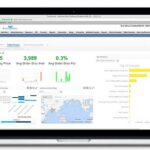The Best Fluffy Pancakes recipe you will fall in love with. Full of tips and tricks to help you make the best pancakes.
1. Introduction to ERP Programs
In the dynamic landscape of modern business, efficiency and effectiveness are paramount. Enter Enterprise Resource Planning (ERP) programs, comprehensive software solutions designed to streamline and optimize various business processes. Over the years, ERP programs have evolved significantly, becoming indispensable tools for organizations worldwide.
Definition and Purpose
ERP programs are integrated systems that enable organizations to manage and automate core business functions such as finance, human resources, supply chain management, and customer relationship management. The primary purpose of ERP programs is to provide a centralized platform for data management, facilitating seamless communication and collaboration across different departments.
Evolution of ERP Programs
ERP programs have come a long way since their inception in the 1960s. Initially focused on inventory control and material requirements planning, ERP systems have expanded to encompass a wide range of functionalities, including advanced analytics, artificial intelligence, and machine learning.
2. Key Features of ERP Programs
Successful ERP programs share several common features that distinguish them from traditional software solutions.
Integration
One of the defining characteristics of ERP programs is their ability to integrate various business processes into a single, cohesive system. By consolidating data and workflows, ERP programs eliminate silos and enable cross-functional collaboration.
Customization
No two organizations are alike, and ERP programs recognize this by offering extensive customization options. From configuring workflows to defining user roles and permissions, ERP systems can be tailored to meet the unique needs and requirements of each organization.
Scalability
As businesses grow and evolve, so too must their software solutions. ERP programs are designed with scalability in mind, allowing organizations to easily expand their usage as their needs change over time.
3. Benefits of Implementing ERP Programs
The adoption of ERP programs offers numerous benefits to organizations seeking to enhance their operational efficiency and strategic decision-making capabilities.
Streamlined Processes
ERP programs streamline business processes by eliminating manual tasks, reducing redundancies, and automating routine workflows. This results in greater efficiency, productivity, and cost savings across the organization.
Improved Data Accuracy
Centralized data management is a cornerstone of ERP programs, ensuring data consistency, integrity, and accuracy throughout the organization. By providing a single source of truth, ERP systems empower users to make informed decisions based on reliable information.
Enhanced Decision Making
ERP programs offer powerful reporting and analytics capabilities that enable organizations to gain actionable insights into their operations. By leveraging real-time data and advanced analytics tools, decision-makers can identify trends, forecast future performance, and proactively address issues before they escalate.
4. Challenges Associated with ERP Implementation
Despite their many benefits, ERP implementation can be a complex and challenging process for organizations.
Cost
One of the primary challenges of ERP implementation is the significant upfront investment required. From software licensing fees to implementation costs and ongoing maintenance expenses, the total cost of ownership can be substantial, particularly for small and medium-sized businesses.
Resistance to Change
Introducing ERP programs often requires organizations to adopt new processes and workflows, which can be met with resistance from employees accustomed to existing ways of working. Overcoming resistance to change requires effective change management strategies and clear communication from leadership.
Data Security Concerns
Centralizing sensitive business data in an ERP system raises concerns about data security and privacy. Organizations must implement robust security measures, such as encryption, access controls, and regular audits, to protect against unauthorized access and data breaches.
5. Tips for Successful ERP Implementation
While ERP implementation can be challenging, following best practices can increase the likelihood of success.
Thorough Planning
Before embarking on an ERP implementation project, organizations should conduct a comprehensive assessment of their current processes, identify key objectives and requirements, and develop a detailed implementation plan with clear milestones and timelines.
Effective Training
User adoption is critical to the success of ERP programs, making effective training essential. Organizations should provide comprehensive training and support to end-users at all levels of the organization, ensuring they have the skills and knowledge to effectively utilize the new system.
Continuous Monitoring and Evaluation
ERP implementation is not a one-time event but an ongoing process. Organizations should establish key performance indicators (KPIs) to measure the success of the implementation and regularly monitor and evaluate the system’s performance to identify areas for improvement.
6. Popular ERP Programs in the Market
Several ERP vendors offer a wide range of solutions tailored to the needs of different industries and business sizes.
SAP ERP
SAP ERP is one of the most widely used ERP systems globally, offering a comprehensive suite of modules for finance, human resources, supply chain management, and more. Known for its robust functionality and scalability, SAP ERP is favored by large enterprises across various industries.
Oracle ERP Cloud
Oracle ERP Cloud is a cloud-based ERP solution that provides organizations with a flexible and scalable platform for managing their core business processes. With built-in artificial intelligence and machine learning capabilities, Oracle ERP Cloud enables organizations to drive innovation and accelerate digital transformation.
Microsoft Dynamics 365
Microsoft Dynamics 365 is a suite of cloud-based business applications that includes ERP and CRM functionalities. Designed to seamlessly integrate with other Microsoft products such as Office 365 and Azure, Dynamics 365 offers organizations a unified platform for managing finances, operations, sales, and customer service.
7. Case Studies of Successful ERP Implementation
Real-world examples illustrate the tangible benefits of ERP programs in driving business transformation and achieving strategic objectives.
Company A: Streamlining Operations
Company A, a manufacturing firm, implemented an ERP system to streamline its production processes and improve inventory management. By integrating production planning, inventory control, and supply chain management into a single system, Company A achieved significant cost savings, reduced lead times, and improved customer satisfaction.
Company B: Improving Financial Management
Company B, a financial services provider, deployed an ERP system to consolidate its disparate financial systems and improve visibility into its financial performance. With real-time access to accurate financial data, Company B was able to streamline reporting processes, enhance financial forecasting, and make more informed strategic decisions.
8. Conclusion
ERP programs have revolutionized the way organizations manage their business operations, offering a comprehensive and integrated approach to data management, process automation, and decision support. While the implementation of ERP systems presents challenges, the potential benefits far outweigh the risks, driving increased efficiency, productivity, and competitiveness.
9. FAQs
1. What is ERP?
ERP stands for Enterprise Resource Planning, which refers to integrated software solutions designed to streamline and optimize various business processes.
2. What are the benefits of implementing an ERP program?
Implementing an ERP program offers numerous benefits, including streamlined processes, improved data accuracy, and enhanced decision-making capabilities.
3. What are some popular ERP programs in the market?
Some popular ERP programs in the market include SAP ERP, Oracle ERP Cloud, and Microsoft Dynamics 365.
4. What are the key features of ERP programs?
Key features of ERP programs include integration, customization, and scalability.



